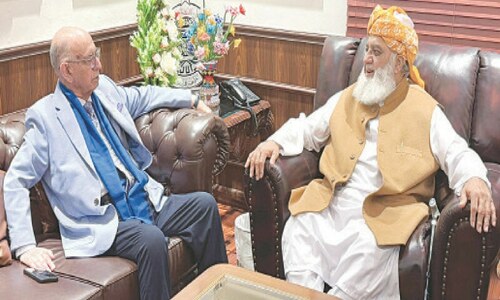
FEBRUARY 15 marks Ghalib’s death anniversary. February is the month when Mushfiq Khwaja, too, bade farewell to this world. Both Ghalib and Mushfiq Khwaja are the writers known for their sharp wit and a splendid gift of repartee.
In one of his humorous articles written in the style of Ghalib’s letters, Mushfiq Khwaja had wittily satirised some of the scholars and critics who sometimes write nonsensical things about Ghalib’s works in a bid to glorify themselves. The letter purports to be written by Ghalib from the heavens and is addressed to Mirza Zafar-ul-Hasan, the founder-secretary of Karachi’s Idara-i-Yadgar-i-Ghalib (IYG) and Ghalib Library.
Ghalib in this letter asks Mirza Zafar-ul-Hasan as to the reasons for his bothering to establish a library in his name when “nobody was interested in reading books”. Mushfiq Khwaja and Zafar-ul-Hasan were close friends and Khwaja Sahib helped him a lot in running IYG. In fact, it was Mushfiq Khwaja who worked behind the scenes to keep both IYD and Ghalib Library afloat after Zafar-ul-Hasan’s death in 1984. So whatever Mushfiq Khwaja wrote about Ghalib Library and Zafar-ul-Hasan was only in lighter vein and in good humour.
But in this letter, Khwaja has taken to task some so-called experts of Ghalib. For example, the letter describes an imaginary meeting between Ghalib and a researcher who has earned a PhD on Ghalib from the University of Karachi. Ghalib writes in this mock letter that:
“ When I asked about the topic of research, he said ‘Ghalib and Tando Adam’. ‘What that Tando Adam is’? I asked.
‘It is the name of a city’, he replied.
‘What has this city got to do with me?’ I asked and the reply was ‘I know. And I have proved in my dissertation that you had nothing to do with Tando Adam’.
This made me angry and I said ‘If you had wanted to prove something, you should have proved that I had had a close association with this city’.
‘That’s exactly what I tried to do but I did not have any material’ was the reply.”
The letter goes on to spoof some critics and researchers who write pointless and hollow articles on Ghalib. For example, says Ghalib in the mock letter, “some scholars find a topic first, say ‘Ghalib and mirror’ and then will pick all the couplets of mine where I have used the word aina (mirror). Then they would simply write a sentence or two between those couplets of mine. And the critical article on Ghalib is ready. Some other scholar would add a few things about how mirrors are made and would name the article ‘Ghalib and mirror-making’ ”.
This parody of Ghalib’s letter was penned by Mushfiq Khwaja a few decades ago and is hard to come by these days. But Sha’er Ali Sha’er has reproduced this letter in the latest issue of Rang-i-adab, an Urdu literary magazine that he edits and publishes from Karachi. This issue of Rang-i-adab is a special one and, as mentioned in the editorial, aims at collecting significant critical and research articles on Ghalib that had appeared long ago.
In doing so, he has brought between the covers some very interesting and significant pieces of literary writings. It includes some articles by Maqsood Hasni on Ghalib and linguistic issues. Also, five articles by Intizar Hussain on Ghalib unfold with the same ease and flow as do this great fiction writer’s creative writings. Abrar Abdus Salam describes in his article Kalidas Guta Raza’s personal collection of rare books on Ghalib and Raza’s love for the great bard. Some articles included in the issue are by other (and real) experts on Ghalib such as Altaf Hussain Hali, Abdur Rahman Bijnori, Malik Ram, Imtiaz Ali Khan Arshi, Nisar Ahmed Farooqi, Farman Fatehpuri, Syed Qudrat Naqvi, Aal-i-Ahmed Suroor, Shaukat Sabzwari and many others.

A section in the magazine is devoted to the humorists who have written on Ghalib. Ghalib’s Urdu letters offer glimpses of a refined and sophisticated sense of humour. Many have tried to write parody of Ghalib’s letters and they include some bigwigs such as Shaukat Thanvi, Furqat Kakorvi, Ibn-i-Insha, Ahmed Jamal Pasha, Anwer Sadeed and Muhammad Khalid Akhter. But few have truly succeeded since Ghalib’s letters are written in an inimitable style. This section includes parodies only by Anwer Ahmed Alvi, Anwer Sadeed and Furqat Kakorvi and others are left out.
But for the lovers of Ghalib, the special issue of Rang-i-adab has brought something to cheer about.
Published in Dawn, February 13th, 2018












































